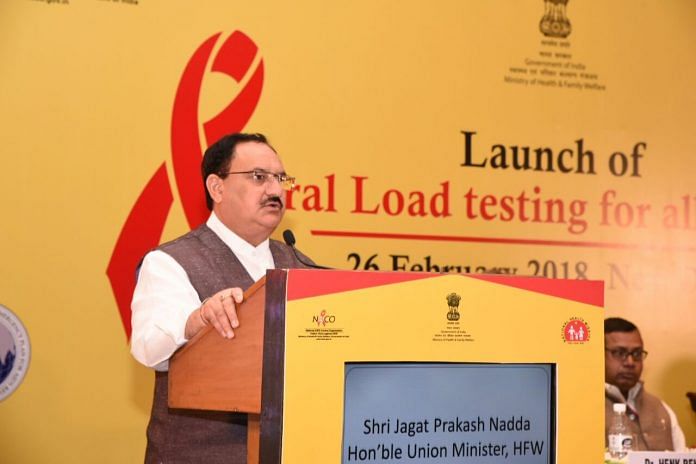India has registered steep decline in new cases and HIV-related deaths, but study highlights link between financial vulnerability and HIV-related risk factors.
New Delhi: India is winning the battle against HIV infections, show the latest estimates by the National AIDS Control Organisation (NACO). However, the pace has slowed down in recent years, and among the reasons for this is the poor economic status of female sex workers who are vulnerable to exploitation.
NACO data shows that India has registered an 80 per cent decline in new HIV infections from the peak levels in 1995. However, it also noted that the rate of decline on this metric has been relatively slow in recent years.
Also, AIDS-related deaths have declined by 71 per cent since the peak level of 2005.
Status of HIV in India
According to a NACO report, India had more than 21 lakh people living with HIV in 2017 — the third largest population in the world after South Africa and Nigeria.
The country reported around 87,580 new HIV infections and 69,110 AIDS-related deaths in 2017.
Also read: The ‘protein baba’ from outskirts of Delhi who claims to cure HIV and cancer
“At 2.04 per cent, Mizoram had the highest adult HIV prevalence in the country, followed by Telangana, Andhra Pradesh, Karnataka, Goa, Delhi and Maharashtra,” NACO’s report said.
Among the states, Maharashtra has the highest number of people living with HIV — around 3.30 lakh, which is 15 per cent of the total HIV-affected population of India.
While new infections are declining nationally, in five states — Arunachal Pradesh, Assam, Mizoram, Meghalaya and Uttarakhand — new infections increased in 2017 in comparison with 2010.
Sex workers’ vulnerability
A separate study conducted by the National Institute of Rural Development and Panchayati Raj (NIRDPR) & Population Council, based on a sample of 4,089 female sex workers from Andhra Pradesh, Telangana, Karnataka, Tamil Nadu, and Maharashtra, found a positive association between financial vulnerability and HIV-related sexual risk factors.
The study, titled ‘Measuring vulnerability among female sex workers in India using a multidimensional framework’, found that a majority of sex workers enter the profession due to financial burden. It also said that a considerably higher proportion of female sex workers from these states experienced physical and sexual violence as compared to the national average.
“Addressing the financial vulnerabilities of female sex workers is important to improve the ability to negotiate with clients, brothel owners and pimps,” it said.
“Evidence suggests that female sex workers with high financial vulnerability and lack of access to social entitlements are more likely to engage in risky sexual behaviour, such as inconsistent use of condoms with clients, alcohol consumption, engaging in anal sex with clients, and experiencing sexually transmitted infections.
Also read: Huge drop in HIV infections in India due to sustained efforts: UN
“The living condition of sex workers in these areas was one of the poorest with a large proportion of these workers being exposed to harsh socio-environmental stress such as lack of proper health care and security.”
The report found that 32 per cent of female sex workers did not have insurance. Over 20 per cent of them did not have any income other than sex work, and more than 16 per cent of them do not have savings accounts in banks or post offices.
“The study found that not having insurance, in particular, was a key factor in defining the financial vulnerability of the sex workers. Given the increasing emphasis on ensuring access to insurance for all individuals by the government of India, this is yet another opportunity for the policymakers to leverage and provide this vulnerable group with financial security,” said Dr Ruchira Bhattacharya, assistant professor, Centre for Gender Studies and Development, NIRDPR.
Within the social protection dimension, half of the respondents lacked awareness on their legal rights, followed by lack of possession of ration cards (21 per cent) and citizen identity cards (17 per cent). Over 13 per cent of female sex workers suffered from food insufficiency.



